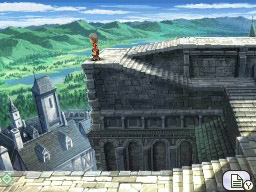Suikoden Tierkreis

In the first Suikoden, close to the end, you have defeated emperor Barbarossa’s army and enter the capital bent on finding him and putting an end to his rule. The capital is also the place in which the game starts, but when entering now the place has lost its color, the people are gone and the cheery music is but a distant echo. Upon walking up to the gates of the palace you find Barbarossa’s last general Ain Gide blocking the way – as he has earlier in the story proven to be a just man a short exchange takes place where your companions try to persuade him to realize the error of the emperor’s ways and step aside. Ain Gide agrees that there may be a point to your quest and admits that he may not be able to stop you, but holds his ground saying that his loyalty lies with his friend the emperor and it would be disgraceful for him to betray that trust – as such, you are forced to cut him down to continue.
This, for me, is an example of what is so great about the earlier Suikoden games – while they have varying degrees of fantastic elements with magic and prophecy in the narrative, at their core they are about politics between nations and how they affect relations between individuals. It is never about saving the world, just about persevering over the opposing force – a force whose goals are no more wrong than your own and whose heroes are fleshed-out characters with ideals. While the story sometimes gets ham-handed or silly the general idea is good, and no other games – or any other media for that matter – have moved me as much as the best parts of the Suikoden games.
Suikoden Tierkreis abandons the Suikoden legacy and is set in an entirely new world and except for a few bullet-points on the backs of the earlier games it also abandons most of the staples of the series. The character-specific weapons, magic system and 6-character parties of the earlier games is replaced with parties of 4 characters that are much more customizable. Random encounters are annoyingly frequent – to some extent the earlier games had this problem but it was alleviated by the now removed “let go” – command that allowed you to escape harmless enemies quickly. While I personally think most of these changes only serve to remove the unique and interesting parts of the Suikoden games, it is mostly a matter of preference… What is worse is how the narrative was changed.
Maybe the fact that the protagonist is no longer silent is what irks me most about the game. Suikoden III tried this as well and was slightly more successful, but in Tierkreis the main character is an annoyingly cheery brat who never gets to tackle any moral choice harder than “Save the world or let it be destroyed”. This is another problem – Tierkreis is not about overthrowing a nation taken over by corrupt leaders, it is about preventing an evil deity from destroying the world. The opposing force is a fanatical religious organization with poorly-defined ideas, and any characters in it are either altogether evil or deceived by the leaders.
It has been said that the Suikoden series didn’t sell well enough and a change of direction was called for. What really saddens me is that this – as was the case with Other M – seems to indicate making a game that removes what is unique and appealing about the series to make it more like the archetypal JRPG.